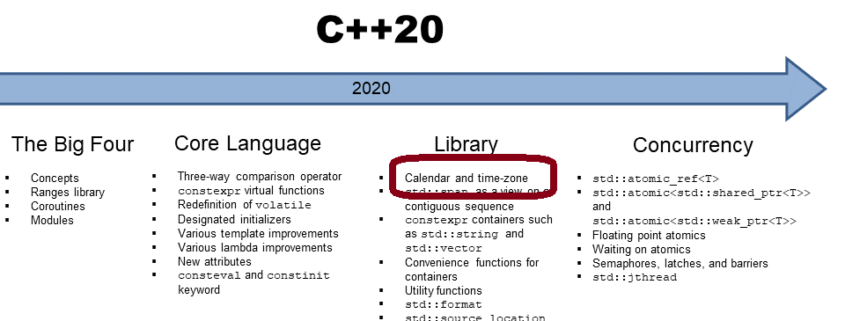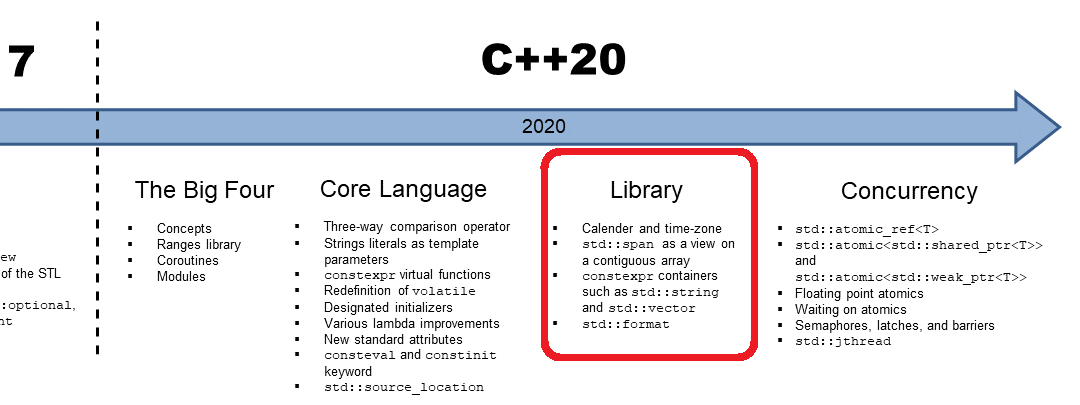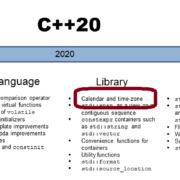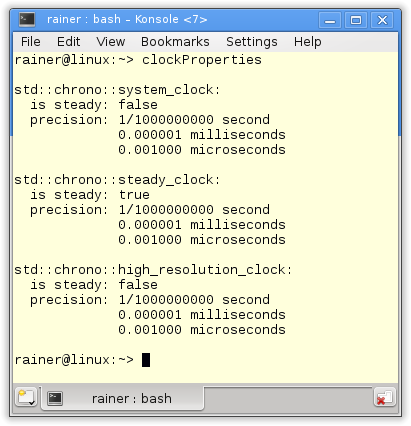Chrono I/O
Chrono I/O consists of reading and writing chrono types. The various chrono types support unformatted writing and formatted one with the new formatting library.

This post is the ninth in my detailed journey through the chrono extension in C++20:
- Basic Chrono Terminology
- Basic Chrono Terminology with Time Duration and Time Point
- Time of Day: Details
- Creating Calendar Dates
- Displaying and Checking Calendar Dates
- Query Calendar Dates and Ordinal Dates
- Time Zones: Details
- Time Zones: Online Classes
Output
Most chrono types, such as time duration, time points, and calendar dates, support direct writing without format specification.
Unformatted
The following tables show the default output format. Let’s start with time durations.
Time Durations

The program displays values for each time duration.
// timeDurationsOutput.cpp #include <chrono> #include <iostream> int main() { std::cout << '\n'; using namespace std::chrono_literals; std::cout << "5ns: " << 5ns << '\n'; std::cout << "std::chrono::nanoseconds(5): " << std::chrono::nanoseconds(5) << '\n'; std::cout << '\n'; std::cout << "5ms: " << 5ms << '\n'; std::cout << "std::chrono::microseconds(5): " << std::chrono::microseconds(5) << '\n'; std::cout << '\n'; std::cout << "5us: " << 5us << '\n'; std::cout << "std::chrono::milliseconds(5): " << std::chrono::milliseconds(5) << '\n'; std::cout << '\n'; std::cout << "5s: " << 5s << '\n'; std::cout << "std::chrono::seconds(5): " << std::chrono::seconds(5) << '\n'; std::cout << '\n'; std::cout << "5min: " << 5min << '\n'; std::cout << "std::chrono::minutes(5): " << std::chrono::minutes(5) << '\n'; std::cout << '\n'; std::cout << "5h: " << 5h << '\n'; std::cout << "std::chrono::hours(5): " << std::chrono::hours(5) << '\n'; std::cout << '\n'; std::cout << "std::chrono::days(5): " << std::chrono::days(5) << '\n'; std::cout << '\n'; std::cout << "std::chrono::weeks(5): " << std::chrono::weeks(5) << '\n'; std::cout << '\n'; std::cout << "std::chrono::months(5): " << std::chrono::months(5) << '\n'; std::cout << '\n'; std::cout << "std::chrono::years(5): " << std::chrono::years(5) << '\n'; std::cout << '\n'; }

The natural numbers in the square braces of std::chrono::weeks, std::chrono::months, and std::chrono::years represent the number of seconds.
Time Points
When you use the C++20 clocks static member function now, you get the date and the time in the following format.
year-month-day hours:minutes:seconds
The following program shows the current time using all C++20 clocks.
// timePointsOutput.cpp #include <chrono> #include <iostream> int main() { std::cout << '\n'; auto nowSystemClock = std::chrono::system_clock::now(); std::cout << "nowSystemClock: " << nowSystemClock << '\n'; auto nowSteadyClock = std::chrono::steady_clock::now(); // std::cout << "nowSteadyClock: " << nowSteadyClock << '\n'; ERROR auto nowFileClock = std::chrono::file_clock::now(); std::cout << "nowFileClock: " << nowFileClock << '\n'; auto nowGPSClock = std::chrono::gps_clock::now(); std::cout << "nowGPSClock: " << nowGPSClock << '\n'; // auto nowlocal_tClock = std::chrono::local_t::now(); ERROR auto nowTAIClock = std::chrono::tai_clock::now(); std::cout << "nowTAIClock: " << nowTAIClock << '\n'; auto nowUTCClock = std::chrono::utc_clock::now(); std::cout << "nowUTCClock: " << nowUTCClock << '\n'; std::cout << '\n'; }
The program shows two interesting facts. First, the current time given by the std::chrono::steady_clock::now() cannot be displayed. Second, the pseudo clock std::chrono::local_t has no static member function now().

The GPS time is 18 seconds ahead of the UTC time. The TAI time is 37 seconds ahead of the UTC time and 19 seconds ahead of the GPS time.
Thanks to the C++17 function std::chrono::floor, you can display the time point in different granularitiy. In this case, the time point has to be of type std::chrono::local_time.
// timePointsOutputGranularity.cpp #include <chrono> #include <iostream> int main() { std::cout << '\n'; auto now = std::chrono::system_clock::now(); auto zonedTime = std::chrono::zoned_time(std::chrono::current_zone(), now); auto localTime = zonedTime.get_local_time(); std::cout << "local_time: " << localTime << '\n'; std::cout << "std::chrono::floor<std::chrono::microseconds>(localTime): " << std::chrono::floor<std::chrono::microseconds>(localTime) << '\n'; std::cout << "std::chrono::floor<std::chrono::milliseconds>(localTime): " << std::chrono::floor<std::chrono::milliseconds>(localTime) << '\n'; std::cout << "std::chrono::floor<std::chrono::seconds>(localTime): " << std::chrono::floor<std::chrono::seconds>(localTime) << '\n'; std::cout << "std::chrono::floor<std::chrono::minutes>(localTime): " << std::chrono::floor<std::chrono::minutes>(localTime) << '\n'; std::cout << "std::chrono::floor<std::chrono::hours>(localTime): " << std::chrono::floor<std::chrono::hours>(localTime) << '\n'; std::cout << "std::chrono::floor<std::chrono::days>(localTime): " << std::chrono::floor<std::chrono::days>(localTime) << '\n'; std::cout << "std::chrono::floor<std::chrono::weeks>(localTime): " << std::chrono::floor<std::chrono::weeks>(localTime) << '\n'; // std::cout << std::chrono::floor<std::chrono::months>(localTime) << '\n'; ERROR // std::cout << std::chrono::floor<std::chrono::years>(localTime) << '\n'; ERROR std::cout << '\n'; }
The program displays localTime in different accuracies, starting with the time duration std::chrono::microseconds and ending with std::chrono::weeks. Curiously, the time durations for std::chrono::months, and std::chrono::years cannot be displayed, but this will be fixed with C++23.

What’s Next?
Additionally, you can display Calendar Dates unformatted.
Thanks a lot to my Patreon Supporters: Matt Braun, Roman Postanciuc, Tobias Zindl, G Prvulovic, Reinhold Dröge, Abernitzke, Frank Grimm, Sakib, Broeserl, António Pina, Sergey Agafyin, Андрей Бурмистров, Jake, GS, Lawton Shoemake, Jozo Leko, John Breland, Venkat Nandam, Jose Francisco, Douglas Tinkham, Kuchlong Kuchlong, Robert Blanch, Truels Wissneth, Mario Luoni, Friedrich Huber, lennonli, Pramod Tikare Muralidhara, Peter Ware, Daniel Hufschläger, Alessandro Pezzato, Bob Perry, Satish Vangipuram, Andi Ireland, Richard Ohnemus, Michael Dunsky, Leo Goodstadt, John Wiederhirn, Yacob Cohen-Arazi, Florian Tischler, Robin Furness, Michael Young, Holger Detering, Bernd Mühlhaus, Stephen Kelley, Kyle Dean, Tusar Palauri, Juan Dent, George Liao, Daniel Ceperley, Jon T Hess, Stephen Totten, Wolfgang Fütterer, Matthias Grün, Phillip Diekmann, Ben Atakora, Ann Shatoff, Rob North, Bhavith C Achar, Marco Parri Empoli, Philipp Lenk, Charles-Jianye Chen, Keith Jeffery, Matt Godbolt, Honey Sukesan, bruce_lee_wayne, Silviu Ardelean, schnapper79, Seeker, and Sundareswaran Senthilvel.
Thanks, in particular, to Jon Hess, Lakshman, Christian Wittenhorst, Sherhy Pyton, Dendi Suhubdy, Sudhakar Belagurusamy, Richard Sargeant, Rusty Fleming, John Nebel, Mipko, Alicja Kaminska, Slavko Radman, and David Poole.
 Modernes C++ Mentoring
Modernes C++ Mentoring
Do you want to stay informed: Subscribe.
| My special thanks to Embarcadero |  |
| My special thanks to PVS-Studio |  |
| My special thanks to Tipi.build |  |
| My special thanks to Take Up Code |  |
| My special thanks to SHAVEDYAKS |  |
Modernes C++ GmbH
Modernes C++ Mentoring (English)
Rainer Grimm
Yalovastraße 20
72108 Rottenburg
Mail: schulung@ModernesCpp.de
Mentoring: www.ModernesCpp.org









